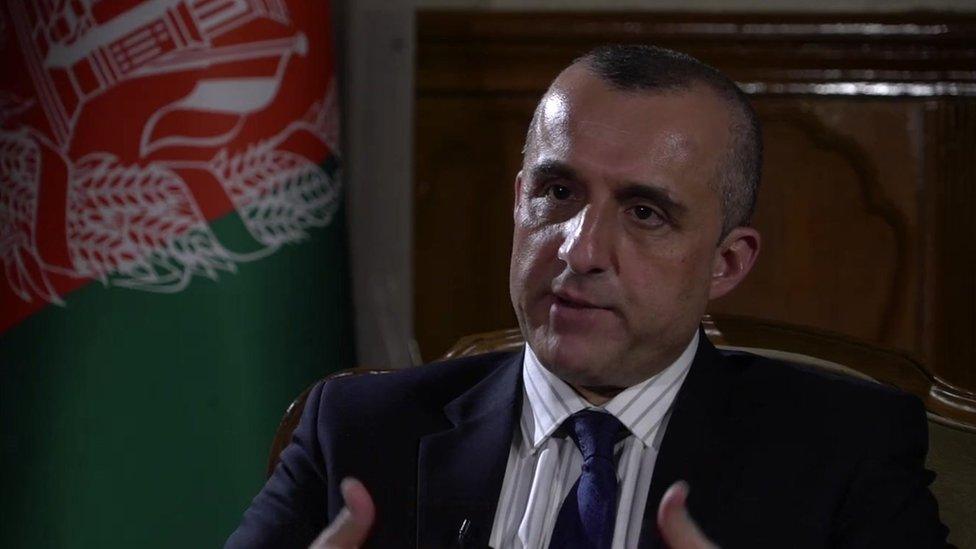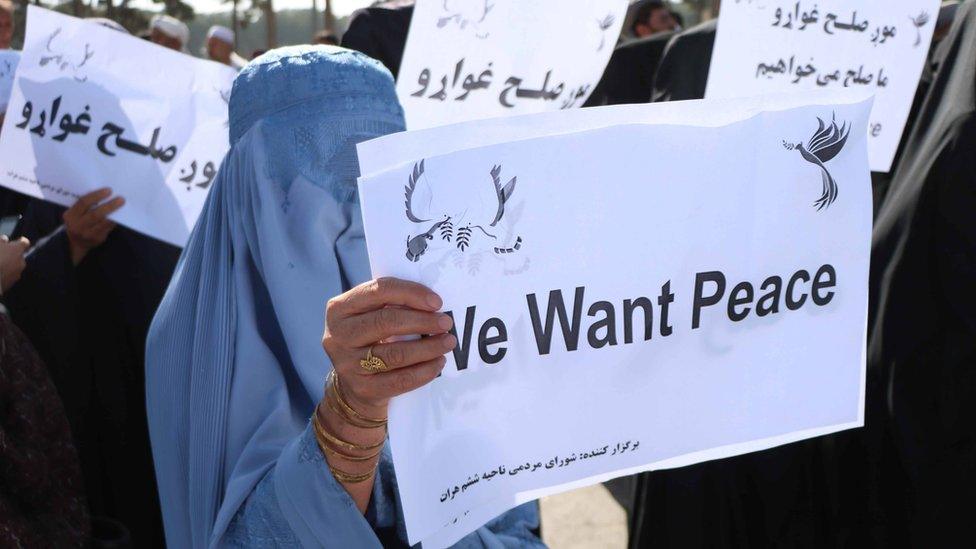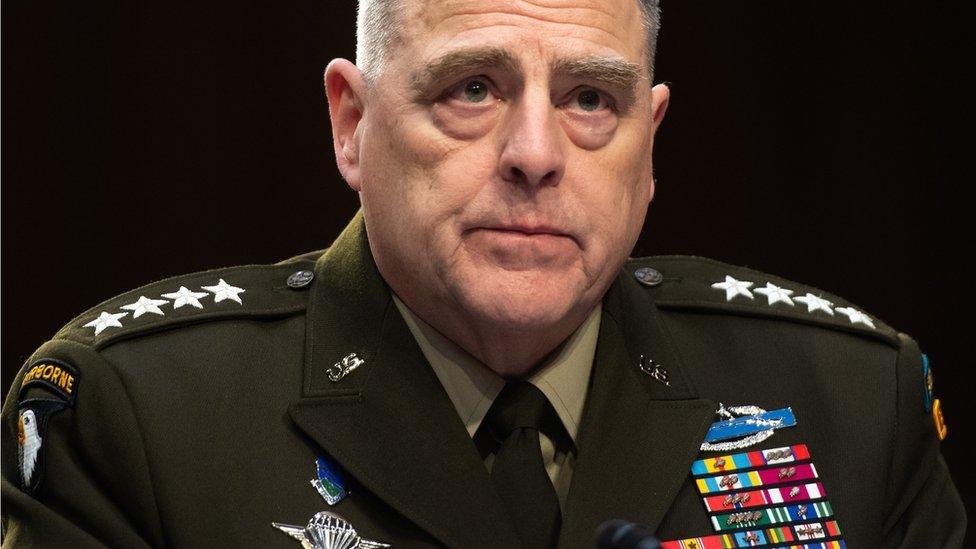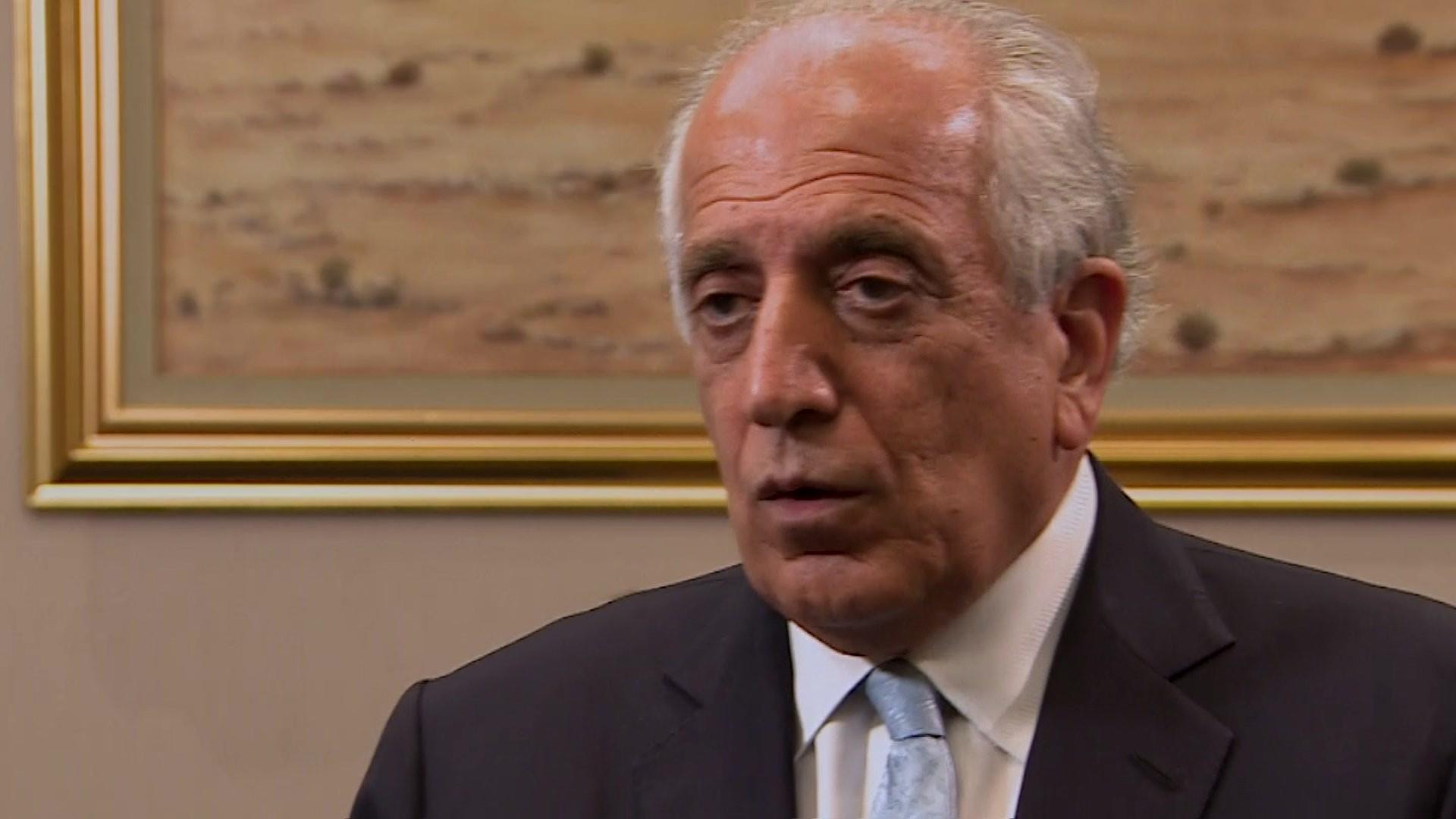US has conceded too much to Taliban, says Afghan vice-president
- Published

Vice-President Amrullah Saleh speaking to the BBC as 2,500 US troops are set to leave Afghanistan
With the US due to complete the withdrawal of another 2,000 troops from Afghanistan, the Afghan vice-president tells the BBC the US made a mistake in conceding too much to the Taliban.
Amrullah Saleh says the American mission, which began 20 years ago, is not yet accomplished.
Last year President Donald Trump made a peace deal with the Taliban and agreed to drastically reduce US troops.
Mr Saleh says the pull-out risks more violence in the unstable country.
The Afghan government has been battling the Taliban, a hard-line Islamic movement, as the group tries to tighten its grip on parts of the country.
The current US presence in Afghanistan dates to 2001 when soldiers invaded to remove the Taliban from power, following the 9/11 terrorist attacks.
But the movement regrouped and by 2018 was active in more than two-thirds of Afghanistan, threatening the elected government.
Thousands have been killed, including 2,400 US soldiers. Mr Trump has been clear that he is determined to withdraw all US troops from the country.
Vice-President Saleh told the BBC that US talks with the Taliban were not a mistake in themselves, but that Mr Trump's administration made an error in giving the group a "massive concession".
The deal signed in February 2020 said that the US and its Nato allies will withdraw all troops in 14 months if the Taliban upholds its promise to stop attacks. The Taliban also promised not to allow al-Qaeda or other militants to operate in areas it controls.
As a condition of starting negotiations with the Afghan government, the Taliban demanded that 5,000 of their men be released from Afghan prisons. The final 400 prisoners were set free in August last year.
Is peace with the Taliban possible?
Following the historic agreement, attacks by Taliban insurgents on international forces stopped, but fighting with Afghan security forces continued.
"I am telling them [US] as a friend and as an ally that trusting the Taliban without putting in a verification mechanism is going to be a fatal mistake," Mr Saleh said.
"The US delegation came to us and swore on every Holy Scripture that if you release these 5,000 Taliban prisoners there will be no violence. We told them at the highest level that our intelligence indicated otherwise, and if we do this violence will spike. Violence has spiked," he added.
He said that the group had not separated itself from terror group al-Qaeda whose leaders are "embedded" inside the Taliban. In October senior UN officials agreed with the assessment that al-Qaeda and the Taliban remain close allies.
"You want to negotiate with terrorism, it's your choice. But we are telling you, don't be deceived," the vice-president says.
"The Taliban were terrorists. They are terrorists today. They are killing women, activists, civil rights activists," he said.
But, he added, Afghanistan is not begging US soldiers to stay and the government accepts America's decision:
"We remain grateful for their assistance. But the fate of my country does not lie with the last US military helicopter."
At the peak of the war, there were 88,000 US troops in Afghanistan. After the completion of the latest withdrawal on Friday, that number will be down to about 2,500., external
The Taliban has told the BBC if all foreign troops do not withdraw by spring, as agreed by the Trump administration, they will resume attacks on international forces.
The Afghan government has been in talks with the Taliban, but it's unclear if and when they will sign a peace deal.
Many fear that if foreign militaries withdraw before a lasting agreement is reached, the Taliban might be back in power.
Mr Trump's successor, Joe Biden, takes office on 20 January and one of his tasks will be to decide what happens to the final American soldiers remaining in Afghanistan.

Afghans fear Taliban return
By Yogita Limaye, BBC News, Afghanistan
There are now estimated to be three times as many Nato troops in Afghanistan as there are US soldiers. Afghan Vice-President Amrullah Saleh told me he believes the mission that foreign troops came here for has not been accomplished, and that the West should be "very worried" about the threat of al-Qaeda if their group is allowed to strengthen its base here.
Many Afghans I've spoken to fear that the Taliban will come back to power if international forces leave without a sustainable peace deal between the Afghan government and the Taliban. Women in particular are worried about what rights they would have.
On the ground, violence has surged, killing dozens of Afghans every day. And the humanitarian situation is perilous - according to the UN, half of all Afghan children under the age of five are facing malnutrition.
In the country's only children's hospital, I met Farishta, the mother of two-year-old Subhan, who can no longer walk because she is malnourished. Farishta told me there are days when they go entirely without food. She blames the war for their suffering. The UN says that six times as many people are in need of life-saving support in Afghanistan than just four years ago.
People here are asking - if foreign troops pull out now, what lasting gains will have been made in 20 years of US-led war?
- Published29 October 2020

- Published17 December 2020

- Published20 October 2020
- Published14 September 2020
